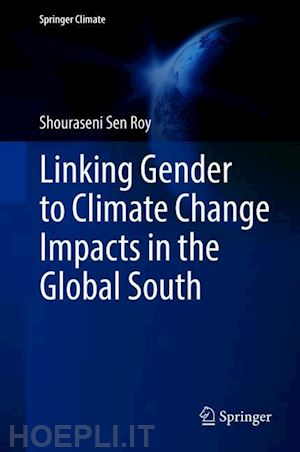
Questo prodotto usufruisce delle SPEDIZIONI GRATIS
selezionando l'opzione Corriere Veloce in fase di ordine.
Pagabile anche con Carta della cultura giovani e del merito, 18App Bonus Cultura e Carta del Docente
This authored book assesses the spatial patterns of climate change and gender inequalities across the Global South, and analyzes the disproportionate impacts that climate change processes have on women in these regions. Though many books attempt to incorporate gender issues into climate change, this book examines the issue as a whole by addressing the relationship between climate change and gender from a number of perspectives. The book incorporates case studies from various regions of the Global South, a designation broadly defined as the countries of Africa, Middle and South America, and most of Asia including the Middle East. In the book's two main sections, readers will learn about how climate change affects access to regional opportunities and resources, the obstacles created by climate change that affect women more strongly than men, and how affected female populations adapt to changing conditions and protect their local livelihoods.
Section one, covering chapters 1and 2, addresses the spatial patterns of climate change and gender inequalities/inequities across the Global South by analyzing long-term trends from the latest reports of the Intergovernmental Panel on Climate Change (IPCC) and the World Economic forum. Section two, covering chapters 3 through 7, discusses the critical issues related to climate change and gender inequality, and presents literature reviews and case studies in the Global South. The different issues and perspectives discussed include health, water and food security, education, conflicts, migration, participation in decision-making processes, and changing urban social landscapes. The concluding chapter discusses policy initiatives and makes recommendations to some of the gender mainstreaming through empowerment and participation. This interdisciplinary book will appeal to academics and policy-makers beyond just the fields of environmental sciences and gender studies, and may be adopted as a resource for graduate studentsand researchers.











Il sito utilizza cookie ed altri strumenti di tracciamento che raccolgono informazioni dal dispositivo dell’utente. Oltre ai cookie tecnici ed analitici aggregati, strettamente necessari per il funzionamento di questo sito web, previo consenso dell’utente possono essere installati cookie di profilazione e marketing e cookie dei social media. Cliccando su “Accetto tutti i cookie” saranno attivate tutte le categorie di cookie. Per accettare solo deterninate categorie di cookie, cliccare invece su “Impostazioni cookie”. Chiudendo il banner o continuando a navigare saranno installati solo cookie tecnici. Per maggiori dettagli, consultare la Cookie Policy.